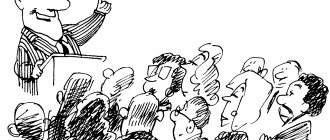The art of eloquence is of great importance, because a person with his words can convince people of anything. Good speech in both personal life and career is a calling card. Therefore, many would like to know how to develop eloquence. Such a skill is certainly necessary in personal self-development. There are special trainings and courses in public speaking. But you can learn eloquence on your own. Simple recommendations and special techniques will help improve your communication skills.
Enrich your vocabulary
Of course, a beautiful speech does not have to be replete with fanciful phrases and bookish words, but you must be able to express your thoughts as accurately and as vividly as possible - this is eloquence.
Don't limit yourself to just words: get acquainted with beautiful phraseological units, catchphrases and euphonious synonyms of words that have already set your teeth on edge. Learn to come up with metaphors and make apt comparisons.
And remember that it is not enough just to know some words and expressions. In eloquence, only active vocabulary matters.
Main types of eloquence
The contemporary art of public communication is diverse. It can be divided into the following types:
- Academic or scientific eloquence - a scientific report, review, lecture, speech in a scientific discussion. It is distinguished by its logical presentation, the presence of objective assessments, conclusions, and formulations. Helps develop a scientific worldview.
- Socio-political eloquence - reports at congresses and conferences, reviews of economic and political topics, speeches at rallies. This type of eloquence is characterized by argumentation, literacy, accuracy, persuasion and calls to action.
- Judicial eloquence is the speech of all participants in trials: accusatory, defensive, self-defense. It has a purposeful influence on the court, with the goal of forming certain views on what happened in order to reach a verdict.
- Theological-ecclesiastical or spiritual eloquence - a sermon, a speech at a council. Emphasizes the inner world of a person, fosters high morality. It is expressive and simple.
- Social and everyday eloquence - speeches at official receptions, anniversaries. This type is characterized by an easy and relaxed style, without polemics and discussions.
- Pedagogical eloquence - the teacher’s speech in lessons and meetings, essays by schoolchildren and students, speeches at school events. It is distinguished by its informativeness, literacy and the presence of most of the elements of beautiful speech.
- Military eloquence is combat orders, appeals, regulations and military memoirs. Conciseness, unambiguousness, clarity, imperative speech form and a high degree of motivation pursue the goal of verbal influence on military personnel.
- Diplomatic eloquence - speech during diplomatic communication between representatives of different states, as well as correspondence. Compliance with the mandatory norms of speech etiquette, wit, grace, expressiveness are the characteristic qualities of this type of eloquence.
Each type of eloquence corresponds to its own sphere of communication. Each of them has its own goals and distinctive features. In general, the science of effective speech communication is called rhetoric and is one of the oldest in human history.
Of course, the skill of eloquence is a successful career, high self-esteem, and a strong personality.
Get rid of mistakes
First of all, you need to get rid of speech errors, that is, errors in the use of words. First, understand the paronyms. You need to distinguish the addressee from the addressee, the instigator from the instigator, and the ignorant from the ignorant.
Be sure to pay attention to spelling: spoiled or spoiled? normalize or normalize? envious or envious?
Also use phraseological units correctly and follow stylistic norms. We recommend reading about other possible mistakes here (in general, you can easily enroll in the Russian Language online program, which will improve your speech).
What prevents you from speaking beautifully and competently?
It is not always difficult for a person to express thoughts beautifully due to lack of education. Often the cause of unpleasant and illogical speech is psychological, organic reasons. Psychologists and psychiatrists pay special attention to speech; it helps the doctor determine whether the patient has problems. The reason for the awkward narrative may be stuttering, logophobia, or mental disorders.
In the first case, speaking beautifully is hindered by a speech disorder, when it is impossible to pronounce certain sounds as a result of spasm of the larynx, excessive tension of the ligaments. Stuttering occurs due to nervous overstrain or increased excitement. Patients notice that at home, with mild pathology, they can speak clearly and clearly; When you go out in public, the situation in society changes. A person suffering from stuttering must always monitor his speech, replace words with more convenient ones, and skip them.
Logophobia is the fear of speech; a person cannot pronounce certain sounds or words, or communicate in general. World studies have shown that among phobias, this one is in 2nd place after the fear of death. You can get rid of the pathology with age, when a person understands that speech impairment is associated with personal fear, the production of adrenaline, and excessive anxiety, leading to spasm of the larynx. Psychotherapists claim that logophobia is more psychological in nature.
With logophobia and stuttering, the experience of positive reinforcement helps. Several successful speeches, without anxiety, in a relaxed state, inspire faith in the patient, allow you to speak more logically, consistently, without thinking about the problem. Psychotherapists and psychologists help overcome speech defects.
When the cause of poor speech is the social environment and lack of education, the problem can be solved without the help of doctors and psychologists. Modern methods, trainings, techniques, advice develop the ability to speak beautifully and competently.
Get rid of what spoils your speech
We are talking about filler words, obscene language and jargon. Get rid of them. We offer two strategies:
- Write down the words that you want to clear from your speech. Select synonyms for them in advance and memorize them. Subsequently, you will replace unwanted words and expressions with them.
- Get used to pausing. Instead of another “uh-uh” or “ah-ah-ah”, it’s better to just be silent. Among other things, such a pause will give weight to your words and give listeners time to think about what you said.
It is better, of course, to combine both strategies. You can also keep a progress journal in which you note how clear your speech was throughout the day.
Appearance in Russia
In ancient times, this art was modified and supplemented with useful techniques. Church leaders also began to use rhetoric, actively attracting new flocks to their faith and presenting irrefutable verbal evidence against heretics. The concept of rhetoric came to Russia from European countries in the 18th century.
Mikhail Vasilievich Lomonosov
The emergence of oratory coincided with the spread of Christianity. It was most often called “the gift of eloquence.” A little later, Lomonosov created the “Russian Grammar”, which included the “Rules of Eloquence”. Such political figures as Stolypin and Trotsky were considered good speakers. A little less, but still Lenin succeeded in understanding this science.
Take an example
Try to regularly read authors whose style you like. Try to highlight what exactly attracts you. Perhaps it is a certain style of speech, perhaps a wealth of vocabulary, perhaps something else. Identify the most “delicious” in someone else’s text and borrow it.
It's the same with speakers: what do you like, what don't you? Why does one performance make a strong impression, while another is forgotten after a couple of days? Try to answer these questions. Observe other people and learn the best from them.
Parasite words
Getting rid of parasitic words is not an easy task. They become a habit, and therefore during a conversation we simply do not notice our speech impediment.
The words “in short”, “well”, “like”, “this”, “as if”, “how to say”, “in general”, “you know”, “actually”, “let’s say”, when repeated many times, destroy all the charm of our presentation, even if we are talking about “smart” things.
Of course, this habit is not so easy to get rid of, which is why we gradually learn to speak without parasites. To do this, you can ask your family or friends to correct you.
As soon as others hear a forbidden word, let them immediately reprimand you. To increase efficiency, come up with a punishment for using filler words.
Get a special piggy bank and put a certain amount of money into it for each mistake you make in a conversation. There are “punishment boxes” in many offices. In this way, companies are fighting slang and profanity among their employees.
If you are an athlete, you may punish yourself differently. For every parasitic word spoken, force yourself to do push-ups.
It is not convenient to do exercises everywhere and not always, so you can write down tasks in a notebook and complete everything that has accumulated during the day in the evening or the next morning.
Just don't evade punishment. Your best assistant is self-control. Over time, you will speak clearly and intelligibly, the main thing is not to give up.
Practice constantly
Practice is the main secret of developing eloquence. Many people who decide to make their speech more beautiful learn new words, learn to build complex sentence structures, etc., but do this in a strictly allotted time, and, for example, continue to communicate with friends in the same way as earlier.
Of course, such an approach will not lead to a good result, and if it does, then this path will be too long and unreasonably difficult. You need to train your eloquence constantly. And in everyday communication as well. We would even say “especially in everyday communication.” Learn to speak beautifully with friends and family - learn to do this in any other conditions. And our course “Oratory: Rhetoric Lessons” will be a good help in this.
We wish you success!
We also recommend reading:
- Storytelling
- How to transfer vocabulary from passive vocabulary to active?
- How to learn to speak beautifully
- Five Canons of Rhetoric
- Rhetoric: how to make your speech effective?
- Strategies for enriching your vocabulary
- How to develop vocabulary
- The power of words in practice
- Why you need to improve your vocabulary
- Development of speech culture
- Rhetorical hand
Key words:1Rhetoric
Oratorical techniques
Oratory techniques are used to improve the perception of information. They work either by orienting the listener to figurative perception, or by stimulating his mental activity.
For example:
- visual comparisons and short illustrative examples are especially appropriate when conveying numerical material;
- repeating what has already been said in other words creates a new image;
- the allegory clearly illustrates the speaker’s ideas and thoughts;
- antithesis by contrast enhances their perception;
- hyperbole exaggerates those points that need to be paid attention to;
- rhetorical questions do not require an answer, but stir up interest;
- an insertion when a casual remark made draws attention to what was said;
- unexpected words and actions heighten the listener's curiosity.
How to learn to understand the taste of a word
There are times when words are the tool that will allow you to achieve your goal: to find mutual understanding, to convince someone, to evoke emotions. People understand words differently. Despite this, first you need to do a lot of work on yourself, understand the taste of the word, and only then learn to influence other people. Therefore, we will primarily focus on the first step. Has it ever happened to you that you suddenly understand the essence and taste of a word that you use every day? This is called insight and happens to everyone. To put this process on stream, in order to develop the skill of noticing what is hidden under the iceberg, you need to adhere to several rules. Read about them in the article. Read more…
8
Five Canons of Rhetoric
One of the greatest orators of all time, Winston Churchill gave a weekly radio address aimed at boosting the confidence of his people during the war. He dispelled their fears and convinced people that they were fighting for a just cause. Over time, his eloquence became legendary. Churchill deeply understood the art of rhetoric and knew how to persuade as if he were communicating with one person - his words had an impact on all people, regardless of values, education or position in society. Special rhetorical canons played a significant role in Churchill’s eloquence, which we invite you to get acquainted with. Read more…
5
Preparing a speech, step-by-step instructions
A good public speech is a well-prepared speech.
“I will improvise, I know the theme”, “I will quickly enter into the element”, “I hope to be inspired”... forget about these sentences. Prepare your presentation and speech down to the last detail. Neglecting this point can cost you dearly - the audience will quickly understand that you are improvising. We offer a step-by-step guide to fully prepare for speaking in front of a group of people.
- Define your goal. To do this, answer the following questions: What is the essence of your speech? What do you want to convey to your audience? What (who) is your speech intended for? What topics do you want to raise? What is related to this topic?
- Gather ideas for your speech topic. Write down any information, dates, useful quotes.
- Organize your materials. Divide the questions into thematic categories. Remember that there should not be too many of them, preferably three - this is the easiest number of sections to remember; with more, they will begin to get lost.
- Build your speech according to the rule of three: first tell the audience what you will be talking about; expand on the topic; summarize.
- Preparing a speech. Write down the content of the speech. Remember that sight reading is not a good idea. Learn the text by heart, but make sure you speak it fluently and don't just say it out loud. It is best to take with you a list of abstracts and the most important data.
- Create a Positive Impression Remember that first impressions play a huge role in all aspects of life. They cannot be changed, so if you want to attract the attention of the audience, try to do this from the first moments. Prepare an anecdote, joke, or reference to current events. Intrigue the listener and make him focus on you and your words. You must evoke in him emotions and a desire to devote this time to you, to be in mental contact with you and, most importantly, to hear you.
Orthoepy - why it is important to speak correctly and how these rules arise
We live in strange times. On the one hand, we are told that in various fields professionalism is valued above all, and not how you dress, how you speak or how you present yourself. On the other hand, everywhere we have to deal with the opposite: a person is judged not by what he is, but by what he appears to be. Therefore, when applying for a job, a well-spoken candidate with dubious professional credentials has a better chance than a true master of his craft who cannot speak. So it is very useful for any person, regardless of his type of activity, to learn how to speak correctly. Even if his profession is not related to public speaking. Read more…
2










